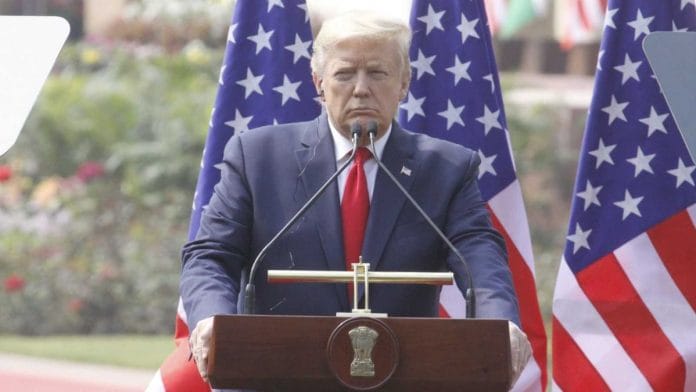New Delhi: Donald Trump as the next President of the United States does not bode well for the deepening climate crisis, environmentalists believe. With the 2024 United Nations Climate Change Conference or 29th edition of the Conference of Parties (COP29) in Baku, Azerbaijan just around the corner, environmentalists, policy makers and climate experts are worried that a Trump-led America will back out of its commitments and derail climate change policies.
“Trump’s victory will be a profound blow to global climate justice and an alarming escalation of climate risk for the world’s most vulnerable communities,” Harjeet Singh, climate activist and global engagement director for the Fossil Fuel Non-Proliferation Treaty Initiative, said in a statement.
Trump’s track record during his first stint at the White House does not inspire much confidence. In 2020, the US, under the Republican leader, withdrew from the Paris Agreement on climate change. Calling the agreement unfair, Trump had said the document allowed countries like India and China to continue using fossil fuels while imposing heavy restrictions on the US.
This decision was reversed when Joe Biden took over. But Trump had warned that if elected, he would pull out of the Paris climate accords aimed at reducing global greenhouse gas emissions. He had also said that he would roll back outgoing President Biden’s electric vehicle policy.
Just hours after the winning trends started coming in, senior Congress leader Jairam Ramesh tweeted the uncertainty about the status of the Paris Agreement once Trump comes to power.
“But what is certain is that the future of the 2015 Paris Agreement on Climate Change which America had rejoined under President Biden is now extremely shaky. If the US were to withdraw again it would be disastrous,” Ramesh tweeted.
Donald Trump has staged an astonishing comeback. Undoubtedly, why and how it happened will be analysed in great detail over the next few weeks, as will the question of what this comeback means for the USA and the rest of the world. But what is certain is that the future of the…
— Jairam Ramesh (@Jairam_Ramesh) November 6, 2024
Also Read: What caused the rise and fall of Harappan civilisation? Studies debunk role of ‘river culture’
Possible implications on climate decisions
Experts are also worried that Trump 2.0 will impact America’s participation in the upcoming UN climate talks. COP29, scheduled to be held in Baku between 12 and 22 November, will see world leaders discuss the climate agenda for the coming year and review the commitments of nations in line with the Paris Agreement.
“His push to ramp up fossil fuel production, disregard for international agreements, and refusal to provide climate finance will deepen the crisis, endangering lives and livelihoods—especially in regions least responsible for, yet most impacted by climate change,” Singh said.
He added that with COP29 talks starting in Baku next week and aiming to secure an ambitious new climate finance goal, Trump’s win will make the path to consensus— which is already a challenging one—steeper and more uncertain.
India may see bilateral investments in clean energy projects
Trump’s past statements criticising climate finance mechanisms such as the Green Climate Fund—labelling them as a wealth distribution scheme that was biassed against the US—also fuels doubts on America’s stand to allocate funds for international climate efforts, with him as the leader.
Experts, however, pointed out that going by the last experience, India may see some bilateral and private sector investments into clean projects. In 2018, the US Overseas Private Investment Corporation (OPIC) committed $350 million to ReNew Power, one of India’s largest renewable energy companies.
Arunabha Ghosh, CEO of the Council on Energy, Environment and Water (CEEW), said in a statement the proposed trade barriers will need careful navigation so that Indian industries—especially the ones for clean energy technologies—do not suffer. Currently, India exports 90 percent of its solar modules to the US.
Over the next four years, India will need to be prepared and strategically nimble to deepen green trade, co-develop clean technology supply chains and accelerate its energy transition, he said.
However, policymakers ThePrint spoke to admitted that under Kamala Harris, India could have expected more funding for its transition needs.
According to them, it is unclear whether India will be able to expect continued financial backing for low-carbon projects in addition to the Quad climate finance initiatives, if Trump comes to power.
Under Biden’s leadership, the US administration worked with India, Japan and Australia to coordinate regional climate finance strategies to increase funding for climate-resilient projects in India and the Indo-Pacific.
In 2021, Biden announced the US-India Climate and Clean Energy Agenda 2030 Partnership to mobilise climate finance for India’s renewable energy and climate adaptation goals.
“Climate impacts have ravaged every part of the world and climate change is much more visible as a determinant of global chaos. No government can afford to ignore multilateralism to solve problems of global commons,” Aarti Khosla, director, Climate Trends, a research-based capacity-building initiative, said in a statement.
(Edited by Radifah Kabir)
Also Read: Water sharing row: Yamuna river board says Himachal must prove release of extra water for Delhi






